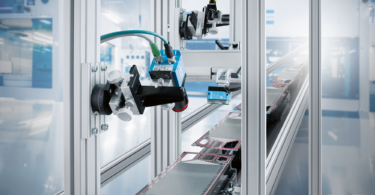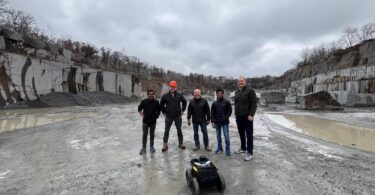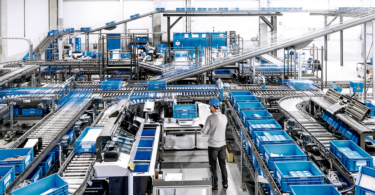Automation in electroplating: more efficient product controlling thanks to location-based solution from SICK

The digital revolution is in full swing. Having an automated process structure results in not only significant cost savings, but also increased productivity and improved transparency. It’s an attractive prospect for many industry players – including the JentnerGroup.
JentnerGroup was looking for an opportunity to automate workflows while simultaneously tracking all the associated processes. And in came the Tag-LOC System from SICK. The system was specially developed for locating and tracking material, load carrier, and industrial vehicles in real time.

Step 1: RFID technology
The JentnerGroup, located in Pforzheim, Germany, is a leading provider in the field of subcontracted electroplating and metal finishing. To retain position, the company is breaking new ground in electroplate finishing.
In the first step toward complete automation, the existing operating data acquisition system was supplemented by RFID technology (Radio Frequency Identification) in summer 2019 – this was the first milestone.

Step 2: UWB Technology
Though this already achieved a great deal, the company wanted the additional option of plant-wide real-time localization with positioning accuracy in the decimeter range.
Because this is where RFID technology reaches its limit, they changed over to UWB sensor technology (ultra-wideband) in the form of the Tag-LOC System from SICK in 2022.
Step 3: Gaining Asset Analytics to Improve Production
The JentnerGroup initially used the system from SICK in barrel plating. The antennas positioned above the electroplating lines receive signals from the tags on the electroplating barrels. The time stamps are transmitted to the Asset Analytics software platform, making it possible to automatically identify all production parts, and to calculate and track the position during the entire, multi-step electroplating process.
Asset Analytics can also be used to record sensor-based data by connecting RFID or barcode systems and convert it into process-relevant information.
This allows the JentnerGroup to benefit from comprehensive data showing the flow of material based on technology-independent software, and to keep an eye on everything via a central user interface.
In concrete terms, this means that as soon as a barrel or rack of goods with a uniquely identifiable UWB tag enters or leaves the area above an electrolyte or wash basin, the Tag-LOC System will recognize this action using the position data and send an appropriate event message to the JSPS (Jentner Smart Plating System, previously BDE) that was developed in-house.

Depending on the surface and the desired layer thickness, this intelligent system calculates the specific adjustment values for each article and transmits them to the rectifier, whereupon the electroplating process will start automatically. It is no longer necessary to manually intervene, and all the important data is saved and prepared for possible analyses.
Connecting Asset Analytics to the JSPS didn’t require any effort to develop either, because everything was conveniently managed via individually configurable JSON webhooks. This allows user-specific information for the enter and exit events to be sent to and received from any http-capable remote station.
“Knowing where each part of the goods is within the workflow at any time enables the customer to carry out predictive processing with forecasts on the predicted delivery quantities and times that are constantly updated,” said Robert Schröder, Product Manager Location Solutions at SICK, who accompanied the project as a consultant.
One manufacturer, many possibilities
This establishes the groundwork for more efficient product control. All information and specifics relevant to the electroplating step are conveyed to a digital production record. The new system offers improved accuracy, range, and flexibility compared to the previous one, while high energy consumption and interference with other radio systems are no longer concerns.
SICK also offers a variety of other products that can be used in different areas such as goods receipt, intermediate storage, and picking. The JentnerGroup has seized this opportunity and implemented additional SICK solutions alongside the Tag-LOC System.

With the Visionary-T 3D snapshot camera, logistics requests can be made to verify whether the goods have arrived and are in the designated pallet location. The corresponding information is also sent to Asset Analytics and further processed and visualized along with the position data, keeping staff always informed.
In addition, individual notifications on the pending receipt of goods can be sent by webhook or other channels (e.g. via e-mail or Teams). For the automated handling of medical instruments using a cobot in a test cell, the InspectorP63x 2D vision camera is being utilized as part of the Prometheus project to detect anomalies on coated medical tools.
The next steps in the process
As part of the digital transformation, the JentnerGroup, in collaboration with SICK, is implementing this digitalization concept at their newly operational site. Modern digital rectifier technology is being used in a 4,000 square meter production space for pure, high-quality manual electroplating. Here, the Tag-LOC System solution includes 26 antennas that monitor 104 baths, two driers, eight assembly workstations, and four temporary storage areas for raw and production material.
“With our new production hall and the wide range of possible applications of the Tag-LOC System in combination with the 3D camera for automating the detection of incoming goods and the AI camera for our cobot from SICK, we are now perfectly positioned,” said Marcel Scheidig, Head of Technology at the JentnerGroup. “We have completely interconnected our data streams so that we can provide our customers with a comprehensive, transparent digital production record with all the relevant influencing variables and parameters for each of their hand-coated workpieces, and also provide them with the CO2 footprint of their coating.”





